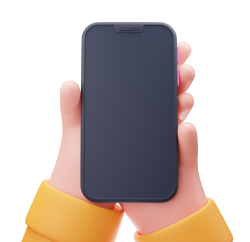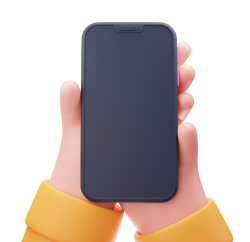
Got a Project? Tell us about it!
We are a leading custom software development agency focused on web, mobile app development & SaaS application development & MVP Development.
How Mobile App Development Services Work? — A Step-by-Step Process
- Development
- Mobile app development
Our experienced team of UX/UI designers and developers will help you stand out with a beautifully designed UX/UI.
How Mobile App Development Services Work? — A Step-by-Step Process
 So you wake up one morning with a brilliant idea for a mobile app– you can explain it, you know it's the most amazing idea ever, and you know your app idea has the potential to amaze many people– what next? The good news is that it's a start in the right direction. The bad news is that very few apps are truly successful. So how do mobile app development services work? What are the requirements for developing an app?
What separates the good from the bad—a stroke of luck? Yes, and many correct steps. While you can earn luck, we'll walk you through the steps to building your app. If you're thinking about creating a mobile app, check out our comprehensive guide to the mobile app development process. We have broken down the entire guide to the mobile app development process into 6 key steps to make it easier for you to understand.
So you wake up one morning with a brilliant idea for a mobile app– you can explain it, you know it's the most amazing idea ever, and you know your app idea has the potential to amaze many people– what next? The good news is that it's a start in the right direction. The bad news is that very few apps are truly successful. So how do mobile app development services work? What are the requirements for developing an app?
What separates the good from the bad—a stroke of luck? Yes, and many correct steps. While you can earn luck, we'll walk you through the steps to building your app. If you're thinking about creating a mobile app, check out our comprehensive guide to the mobile app development process. We have broken down the entire guide to the mobile app development process into 6 key steps to make it easier for you to understand.
Mobile App Development Services
Mobile app development services include everything from business analysis and UI/UX design to mobile app testing and deployment. At Mobirevo, we cover all stages of mobile app development and provide them as stand-alone services as well as part of our full-cycle mobile app development.-
Want to build an iOS Mobile Application ?
Our experienced team will help you stand out with a bespoke, flexible, and scalable software application for your business.
Mobile Development Consulting
-
Recomended Reading: How We Can Help You Build an ERP System from Scratch Introduction
Mobile App Design & Development
-
Backend Development
-
Recomended Reading: How to Hire a Blockchain Development Company for your Project
Mobile App Support & Evolution
-
Want to build a Bespoke Software ?
Our experienced team of will help you stand out with a bespoke, flexible and scalable software application for your business.
Quality Assurance & Optimization
What is Mobile App Development
 Mobile application development refers to the processes of developing software for small, wireless computing devices like smartphones and other handheld devices. Mobile application development, like web application development, has its origins in traditional software development. Mobile apps, on the other hand, are frequently written specifically to take advantage of the unique features of a particular mobile device.
For example, a gaming app could make use of the iPhone's accelerometer, and a mobile health app could make use of a smartwatch's temperature sensor. Apple's iOS and Google's Android are the two most popular mobile platforms today. Essential apps, such as a full web browser and access to the Apple App Store, come preloaded on Apple phones and tablets. Android devices come preloaded with similar apps, and you can download more from the Google Play Store.
Mobile application development refers to the processes of developing software for small, wireless computing devices like smartphones and other handheld devices. Mobile application development, like web application development, has its origins in traditional software development. Mobile apps, on the other hand, are frequently written specifically to take advantage of the unique features of a particular mobile device.
For example, a gaming app could make use of the iPhone's accelerometer, and a mobile health app could make use of a smartwatch's temperature sensor. Apple's iOS and Google's Android are the two most popular mobile platforms today. Essential apps, such as a full web browser and access to the Apple App Store, come preloaded on Apple phones and tablets. Android devices come preloaded with similar apps, and you can download more from the Google Play Store.
Stages of Our Mobile App Development Process
1. Strategy
The first step in the mobile app development process is to define your strategy for turning your idea into a successful app. You could incorporate a larger portion of this into your overall enterprise mobility strategy. Although the goals of one app may differ from those of another, each app has its impact on the mobility strategy, which must be considered during the development process. During this stage, you will:- Determine the app's users.
- Investigate the competition.
- Set the app's goals and objectives.
- Choose a mobile platform for your application.
Our experienced team of android developers will help you stand out with a efficient and fast mobile app for your business.
2. Analysis and Planning
At this point, your app concept begins to take shape and develops into a full-fledged project. The process of analysis and planning begins with the definition of use cases and the capture of detailed functional requirements. Prepare a product roadmap after you've identified the requirements for your app. This includes prioritizing the requirements for the mobile app and categorizing them into delivery milestones. If time, resources, or money are an issue, define your minimum viable product (MVP) and prioritize it for the initial launch. The planning phase includes determining the skills required for your app development project. The iOS and Android mobile platforms, for example, use different development technology stacks. Your mobile development team should include both iOS and Android developers if you want to create a mobile app for both platforms. Have you chosen a name for your mobile app yet? Mobile app names, like domain names, must be distinct within each app store. Check each app store to make sure the name of your app isn't already taken!3. UI/UX Design
The goal of app design is to create a polished user experience that is seamless and effortless. The success of a mobile app is determined by how well users adopt and utilize all of its features. The goal of UI/UX design for mobile apps is to create excellent user experiences that make your app interactive, intuitive, and simple to use. While a well-designed user interface will help with early adoption, your app must also provide intuitive user experiences to keep users interested. The goal of app design is to provide a seamless and effortless user experience.- Information Architecture & Workflows
- Wireframes
- Style Guide
- What type of font will your app's text use?
- What color scheme will be used?
- How will the app design reflect your company's brand?
- Mockups
- Prototype
4. Mobile App Development
The planning stage of the mobile app development process is still crucial. You must define the technical architecture, choose a technology stack, and set development milestones before you begin actual development/programming efforts. A typical mobile app project includes back-end/server technology, API(s), and the mobile app front-end.- Back-End/Server Technology
- API
- Mobile App Front-End
5. Testing
Thorough quality assurance (QA) testing during the mobile app development process ensures that the applications are stable, usable, and secure. To ensure thorough QA testing of your app, you must first prepare test cases that cover all aspects of app testing. Test cases drive mobile app testing in the same way that use cases drive the development process. Test cases are used to carry out test steps, record testing results for software quality evaluation, and track fixes for retesting. Involving your QA team in the Analysis and Design stages is a best practice approach. Knowing the functional requirements and objectives of your app will help you create accurate test cases. To provide a high-quality mobility solution, your app should go through the following testing procedures. Thorough quality assurance (QA) testing during the mobile app development process ensures that the applications are stable, usable, and secure.- User Experience Testing
- Functional Testing
- Performance Testing
- How responsive is your app to user input?
- How quickly do the app's screens load?
- Is your app causing memory leaks or draining the phone's battery?
- Is your app effectively utilizing network bandwidth?
- Is your app consuming more memory than it should?
- Security Testing
- Device and Platform Testing
Our experienced team of Flutter and React-native developers will help you stand out with an efficient and fast mobile app for your business.
6. Deployment & Support
To release a native mobile app, you must first submit it to the app stores, which are the Apple App Store for iOS apps and Google Play for Android apps. Before launching your mobile app, you must first create a developer account with the Apple App Store and the Google Play Store. The release of an app in the app store necessitates the preparation of metadata, which includes:- Your app’s title
- Description
- Category
- Keywords
- Launch icon
- App Store screenshots
Technologies Used By Mobile App Development Service Providers
 We are always up-to-date on the latest trends in the world of mobile development and welcome mobile projects involving the following mobile app development technologies; Smart TVs, Internet of Things, Wearables, Augmented Reality (AR), Virtual Reality (VR), Artificial Intelligence (AI), image recognition, eCommerce, Mobile business intelligence (BI), and Blockchain. To delight your users with expressive and feature-rich native iOS/Android, cross-platform, or Progressive Web Apps, you can leverage our extensive experience working with all major technologies.
We are always up-to-date on the latest trends in the world of mobile development and welcome mobile projects involving the following mobile app development technologies; Smart TVs, Internet of Things, Wearables, Augmented Reality (AR), Virtual Reality (VR), Artificial Intelligence (AI), image recognition, eCommerce, Mobile business intelligence (BI), and Blockchain. To delight your users with expressive and feature-rich native iOS/Android, cross-platform, or Progressive Web Apps, you can leverage our extensive experience working with all major technologies.
1. iOS App Development
We have all the knowledge and experience required to create full-fledged, stable, and scalable mobile applications, including:- iPhone App Development
- iPad App Development
- Apple Watch App Development
- Apple TV App Development
- App Clips Development
2. Android App Development
Using cutting-edge technology, we assist businesses in establishing a presence on any modern device and platform, including:- Android Mobile App Development
- Android TV App Development
- Android Tablet App Development
- Android Wear App Development
3. Cross-platform App Development
Get high-quality mobile apps that run on multiple platforms for a low price, all while giving your users an app that is compatible with their operating system. Use this option to cut costs and shorten time-to-market while reaching a larger audience without sacrificing quality, such as:- Hybrid Mobile App Development
- Hybrid Tablet App Development
- Hybrid TV App Development
4. Progressive Web App Development
We create Progressive Web Apps that combine the best technical solutions used in mobile and web applications, which are beneficial in terms of ease of development and distribution, as well as a variety of other business benefits. You can speak with one of our experts about;- Cross-browser Web App Development
- Responsive Web App Development
- Offline Web App Development
How to Choose a Mobile App Development Service Provider
 It can be difficult to find the right app development team. Sorting through all the good options can be difficult. The goal of finding the right partner, on the other hand, will be to find a company that understands exactly what you want and can work with it. The following criteria will assist you in determining how to select the best mobile app development company:
It can be difficult to find the right app development team. Sorting through all the good options can be difficult. The goal of finding the right partner, on the other hand, will be to find a company that understands exactly what you want and can work with it. The following criteria will assist you in determining how to select the best mobile app development company:
1. The Company’s Portfolio
You'll want to know that the company is aware of your project and what you're working on. Check out some of their previous work to get a better idea of what they're capable of. Knowing their track record will help you determine whether the company is a good fit for you. Inquire about their portfolio and some of the apps they've previously created. It will be especially helpful if you can find apps that are similar to what you want to build. Examine the app's interface, ease of use, and some available reviews.2. Take Note Of The Company’s Expertise
You should also be able to see that the company you chose is capable of handling the job. They should understand the critical features of the app you want to build and have a clear vision of how to collaborate with them. The developers must also be able to explain how to implement the features they propose and recommend appropriate frameworks. Check to see if their software can integrate with any of your other workflows or systems.3. Cost of Development
Price negotiations are also an important consideration when selecting a development company. Finally, you must save money on your processes. As a result, it's understandable that you'd want to look for ways to save money. It's not a good idea to go with the cheapest option when developing an app. Allowing price to dictate your decision will only lead to poor choices. Remember that you must create a fantastic product, not the cheapest one available. With a team of knowledgeable specialists, you can strike a balance between price and quality. Maintain a budget and stick to it, and let the quality of their work determine whether they fit into your plans. At the same time, before you sign, make sure your budget is clear and flexible enough. You can inquire about the development firm's processes and milestones, as well as how they charge — whether time and material or fixed-price. Be wary of companies that provide you with quick fixed-price estimates. Software development is complex, with many variables that are difficult to predict. Instead, go with a company that charges by the hour and is open about its reporting.4. Effective Communication
Without effective communication, no project can progress. If you and the team will be working closely together, you must maintain open communication lines and make it easy to exchange ideas and suggestions. Communication also allows you to share ideas and go over project details in greater depth. The ideal app development team should be available to discuss project details at least once a week. Keep an eye on the team and how they respond to your messages and phone calls. They should offer their thoughts, just as you do yours. You should also keep an eye on the team's ideation process. Examine whether they appear to be genuinely interested in the project. If the developers aren't communicating during this process, it's a pretty good indication that they aren't all that interested in the job in the first place. Choose a company that is eager to establish a relationship with you. Everyone should be able to contribute ideas and opinions toward the common goal of creating the best app possible.5. The Company’s Preferred Platforms
You should also be aware of the platforms on which the development team is most at ease. Can they create apps for multiple platforms, or do they specialize in a few? If you want to create an app that works across multiple platforms, be clear about it and choose a company that can help you bring it to life. As a result, keep an eye out for cross-platform services. The ideal company will understand each platform's guidelines and work within the appropriate parameters.6. Your Level of Involvement
No matter how talented the company's developers are, they will be unable to create your app without your input. Inquire about how much involvement they will require from you and how you can work together to move forward.7. The Projects Timelines
Inquire with them about project timelines as well. Above all, inquire about their availability. Many app development teams work on multiple projects concurrently. You need to know that these guys are here to help you and are willing to put in the effort. Inquire about the number of projects they are currently working on, their ability to deliver your project on time, and the protocols in place to accommodate your needs if a delay occurs. It is critical to note that dedicated resources are available to handle your project. This way, you can be confident in the company's ability to respond quickly to suggestions and changes – or any other unforeseen project challenges. For instance, while brainstorming with our client for the Wiconn app, we outlined all the project objectives that were expected. This helped us create a detailed timeline for each deliverable and product feature.8. Understand The Company’s Design Scheme
As you may already be aware, developing an app entails more than just coding. In addition, a proper design and a stable user experience are required. As a result, you must ensure that the app is designed in accordance with the most recent user experience principles. So, be sure to inquire about the company's approach to design and what they look for most in terms of user experience. It would also be beneficial if you could view the team's previous work to judge for yourself and confirm that they are the right fit for the job. To ensure that the company understands what you want, you will need to create a clear, detailed explanation of the project. Inquire about their understanding of the project and what they believe is the best approach. Product discovery workshops are held by good software houses to ensure that the scope of work is clear and that everyone is on the same page from the start. Request app mockups, design sketches, and other materials to test their understanding of what you require. You may need to make some adjustments to align their work with your vision, but they should have a good idea of where you're going.9. Release Procedures
You should also inquire about the company's release policy. They should have policies in place regarding app submissions and how they handle releases. A good company will, ideally, either submit the app for you or guide you through the submission process. You need partners who will stick with you throughout the submission process and the app lifecycle, not those who will abandon you once the app is live and move on to the next client.10. The App Maintenance Procedures
Even after the app is up and running, there's a good chance you'll need to make some changes to it. When it comes to apps, fixes, bug patches, and new features are commonplace. As a result, the app development company should have a strict policy in place in such cases. For example, inquire whether the company charges maintenance on an hourly or monthly basis. In general, check to see what policies are in place for the following:- The cost of each app that is released
- Their procedure for dealing with bug fixes
- They provide post-launch assistance.
- Their procedure for introducing new features
Conclusion
App development is an ongoing process that will continue as you receive user feedback and add new features after the initial launch. We hope that the information in this article will help you find a reliable Mobile App Development Company. If you have any urgent questions about Mobile App Development, you can get in touch with the Mobirevo team. Mobirevo is a leading mobile app development company in Nigeria. We have provided mobile app development services to companies in finance, healthcare, construction, retail, consumer products, logistics, industrial engineering, and entertainment over the years. Let’s talk about making your Mobile app ideas a reality! We follow a certified enterprise mobile app development process steps to ensure the success of your app's launch. Our skilled mobile app developers are here to assist you with your digital transformation. You can contact us today to get a free quote. Our team at Mobirevo strives to provide unrivaled services to all of our valued clients. You can also check out our case study page to see our client’s portfolio and get a better understanding of the quality of products we deliver. Also, contact us if you have any questions about our services, and we will get back to you as soon as possible. Want to receive more content like this? You can sign up for our newsletter, which features curated opinions, and Mobile app development tools for building remarkable digital assets. If you sign up for our weekly newsletter, you will be the first to know when we publish awesome content like this. You can also visit our blog to see other content created with love by our amazing team.[ultimate-faqs include_category=' How Mobile App Development Services Work']
Got a Project? Tell us about it!
We are a leading custom software development agency focused on web, mobile app development & SaaS application development & MVP Development.
Subscribe to Our Newsletter
Join over 5,000 enterpreneurs and businesses who already have a head start.
Got a Project? Tell us about it!
Our Engagement Models
OUR PRESENCE
BLOCKCHAIN
OTHER SERVICES WE OFFER
CONTACT
Copyright © 2022 Mobirevo Software & Technologies LTD a company duly registered with CAC with RC Number: 1756190. All rights reserved.

Got a Project? Tell us about it!
We are a leading custom software development agency focused on web, mobile app development & SaaS application development & MVP Development.





